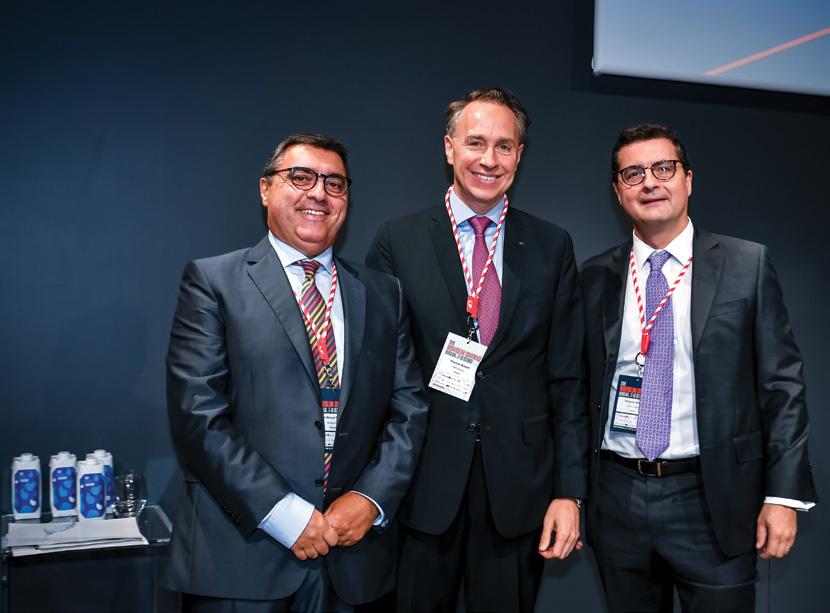
4 minute read
A Growing Role in a Changing World
Thomas Buberl - AXA Group CEO
The need to adapt to change affects us all but one individual who has to consider this perhaps more than most is AXA Group CEO, Thomas Buberl.
Advertisement
Responsible for over €100bn in revenue generated by over 170,000 employees who serve 105 million customers in 61 countries, it’s fair to say he has a lot of responsibility resting on his shoulders.
But as he explained to delegates at the conference, a key part of his responsibility is to understand global societal trends and make sure that AXA is well positioned to not just survive but to thrive in a new social and business environment. He believes that while change can create a great deal of uncertainty, it can also create a huge amount of opportunity for the industry.
“When you think about insurers and brokers,” he said, “what is the role they must play?
“It is to continue to ensure cohesion in society. And at a time when risk and uncertainty has increased this is a very good playground for us.
“More uncertainty means more risks, more need to anticipate and understand and insure the risks. We are entering a period which will become very determining for us if we have the courage to act.”

José Manuel Fonseca, Thomas Buberl, Grégory Allard
But in order to act effectively, it is necessary to not only understand what the key emerging risks are but also, to understand how they are manifesting themselves. Buberl explained that the three key risks had not changed over the last 5-7 years but that the nature of them and their interdependency had.
Perhaps predictably, climate change was the first he addressed arguing that the very behaviour that had made humans successful would, if unchanged, work against us.
“How can we change our behaviour and how do we find solutions that don’t only treat the extremes?” he queried. “Moving from coal to green energy is a good first step but we need a slower transition from coal to gas and so on from there towards green energy.”
The second risk on his mind was the technological risk. He asked the audience to think past cyber risk and focus more on the impact that things like artificial intelligence will have upon our society.
“What does this mean for the wellbeing of society and what do we need to do to be relevant tomorrow?”
He argued that there was a geopolitical question embedded within this tech risk, particularly concerning the US and China.
“Instead of working together we are trying to separate each other. We will probably have two systems that will need separate investments, always apart and with different rules of engagement and compliance,” he predicted.
“Then there is data. In a world where tech powers are separating, data transfer is being discussed with different standards of data protection across the world. How can we make sure we are moving forward so we can take advantage of those advances?” he asked.
And finally, the third risk — geopolitical shifts.
“In the past, there was a global multilateralism which made it easy to leverage globalisation and benefit from exchange. Today we see that is not the case anymore. We see massive shifts in how countries do or don’t work together anymore and there are significant conflicts within countries.”
He cited examples such as Brexit — “It is more an internal conflict within the UK than it is between the UK and EU” — and the ongoing protests in Hong Kong and in France with the gilets jaunes.
“These are examples of increasing fragmentation, of a geopolitical recession. How can we live up to solving and controlling these risks more?”
But he argued that these issues are made even more complex by the fact that they are interlinked and influence one another.
“Tackling climate change means a change of behaviour for everyone but that means our society will not prosper from development as much as it used to,” he said. “This will hit the people who are already suffering first.”
He pointed once again to the experience in France where a rise in fuel tax as part of wider environmental efforts triggered huge national protests, revealing how social fragmentation was acting as an impediment to solving the climate problem.
And the same issue could be seen in development and implementation of tech.
“If you want to benefit from tech innovation, you need to have the leaders and employees in companies to embrace the change. But if the new tech means that people are not sure they will have a job tomorrow, you will see massive resistance to that change,” he warned.
He pointed out that such is the scale and fundamental nature of these issues that governments were increasingly unable to tackle them alone.
he said.
But with this responsibility, he argued, comes a real opportunity for the insurance industry.
“Increased risk means increased demand. Increased aversion to risk, means more demand in talking to us. Our time has never been as good. We are about to enter a new golden age of insurance,” he predicted.
And on a parting note, he told delegates that, as AXA had done in refocusing on new priority markets, they had to be willing to rethink their propositions: “We live in uncertain times, but uncertainty is our business.”


